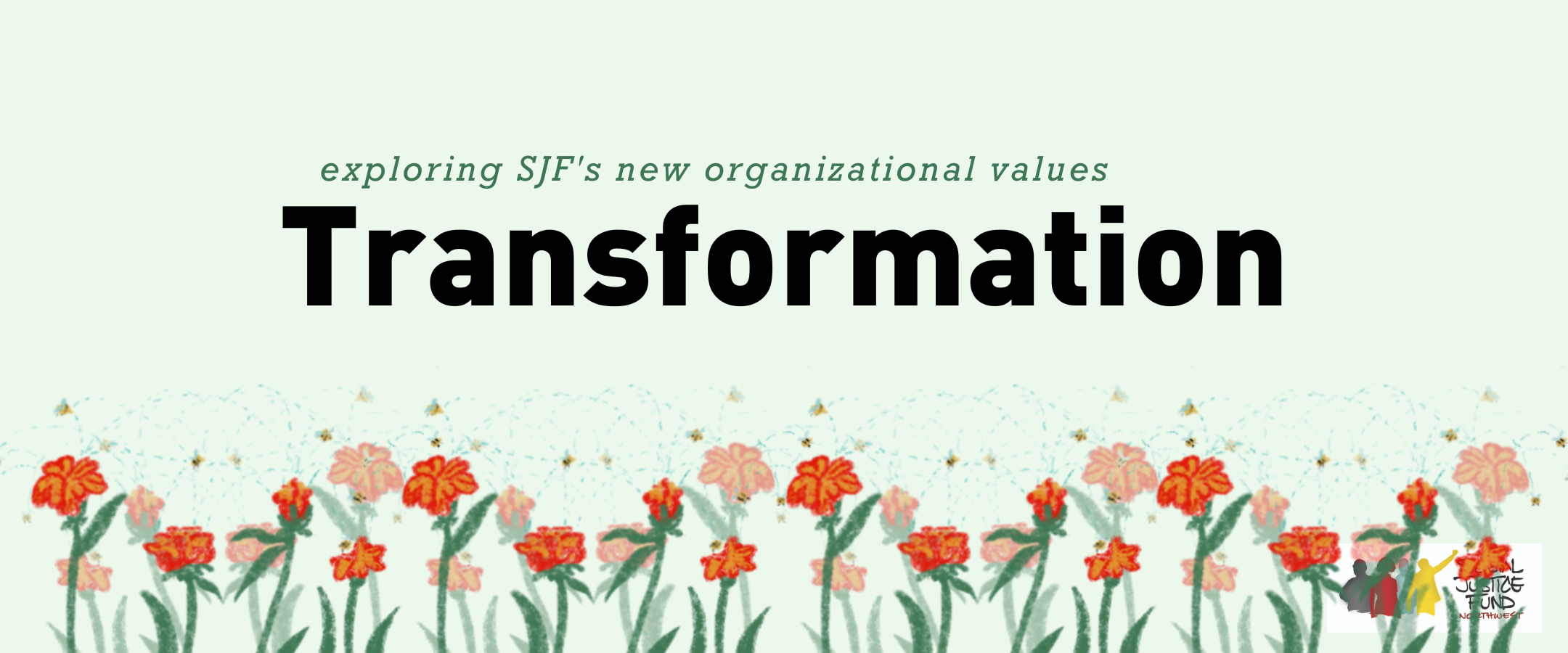
News + Events

Hi all! This is Amy Truax, and I’m the Data & Finances Coordinator at SJF. I started here just last year, in June of 2022, when we were in the midst of revamping our organizational values. It’s been delightful to see these values getting put into practice throughout our work over the past year, and I’m so excited to get to talk about our value of Transformation. I specifically requested to write about Transformation, because it is also a key value for me on a personal level. (In my other life outside of SJF, I’m a practicing astrologer, and a Scorpio. Transformation is a Scorpio keyword!) Something I find especially juicy about the concept of Transformation is the way in which it encompasses many other values that I also hold dear: humility, accountability, and curiosity. In this blog post, I’ll touch on those other values and also talk about why transformation is so important to our work at SJF and in the philanthropy world overall.
First, holding transformation as a value necessitates humility. When people are convinced they are always right or unable to receive feedback, they simply do not change. They become transformation-averse. This state keeps them stuck in their ways, stuck in the past, and they stay afraid. We see this all the time in the philanthropy world, which is too often marked by reactivity, fear of what is new, and a mindset subsumed by scarcity. I’m reminded of the counterintuitive reality that in order for buildings to be earthquake resistant, they actually need to be more flexible, not less. The site of a building or a bridge swaying might look scary, but it’s actually a sign of safety, resilience, and fortitude. Likewise, the more rigid we are (individually and collectively), the easier we are to break. In order to withstand the shakes and tremors we experience in living under and fighting against different forms of oppression, we need to be able to move in response to them, rooting ourselves on a strength built upon creativity, adaptation, and resilience, instead of inflexibility.
Transformation is also about holding innate curiosity for the world around us. It encourages us to ask, “How can I do this better? What angles am I not considering? What do I know now that I didn’t know in the past?” What’s beautiful (and challenging!) is that we can do this while also holding the reality that perfection isn’t possible, or even desirable.
When we flip our understanding from trying to reach perfection to embracing a theory of transformation, we can free ourselves and challenge ourselves at the same time. Transformation is always going to be an ongoing process, something that is never finished, a north star to look towards. The thing about north stars is that by definition, they are unreachable. They are a guide post, but they are not a destination. Standing in the messiness of transformation allows us to continue striving towards our north star while being present with what is.
When we think about the role of transformation in philanthropy in particular, we should recognize that transformation isn’t possible without resources of some kind. Not only do we as grantmakers need to transform on a continual basis, but we need to hold the entire concept close to our hearts as it is at the crux of our work. At its best, philanthropy can provide robust challenges to the status quo; we are giving away money so that organizations can change lives. It’s when we fall into patterns instilled in us from white supremacy capitalism that we become fearful, rigid, and conservative. Embracing transformation pushes us to our edges, but it’s what creates change. A recent example that comes to mind is what Vu Le has called #DAFHobbyGate, where a lot of the philanthropy old guard bristled at Le’s well-founded criticisms regarding the billions of dollars parked in Donor Advised Funds that aren’t going to the communities that need them. Here we can see a twofold barrier towards our work of Transformation–not only are folks not getting the funds they need, but an attempt to call that system out resulted in a huge backlash against Le. This provides a prominent example of how a refusal to transform can cause harm and contribute to oppression.
Since accountability is its own value at SJF and will have its own blog post in the future, I won’t dive too much into the connections between it and transformation; but I will say that you simply cannot have one without the other. Accountability without transformation is impossible, as accountability necessitates change. And transformation without accountability is irresponsible, as we need to be beholden to our communities in order to ensure we are transforming in the right direction.
Closing Thoughts
Transformation, as well as all our values, can be messy in process. It gives us the opportunity to reevaluate our impact regularly. There will be missteps and disagreements along the way, and there should be! We are complex beings living under a system that devalues our humanity. We do our best to exist in that system while simultaneously prefiguring the world we want to live in. How could such a process not be messy? The beauty is in recognizing that messiness is natural, embracing it, and agreeing to do our best anyways. I’m so excited for SJF to continue to do that work and honored to get to be a part of it.
Resources for Thinking More about Transformation:
- Nonprofit Quarterly – Toward Love, Healing, Resilience & Alignment: The Inner Work of Social Transformation & Justice
- adrienne maree brown – Emergent Strategy
- Alexis Pauline Gumbs – Undrowned
- Justice Funders – Resonance: A Framework for Philanthropic Transformation
- Community-Centric Fundraising Principles